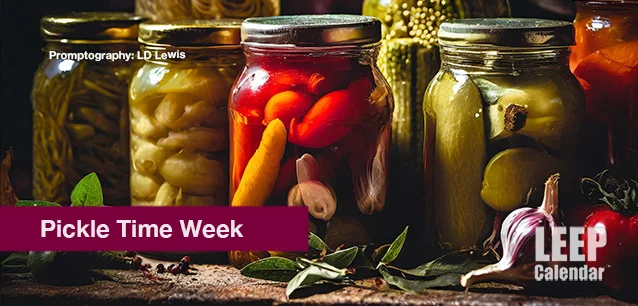 AD
AD
Today is: November 12
Scroll to explore events active on this date.
LEEP INK FEATURES

August? Absolutely!
In August, we live through the Dog Days of Summer. It's hot and often humid, and those who can leave for better climates do. Down south, winter is in full force. August is also known as "the ...

In The Heat of July: July 2025 Events
Is it hot enough (or cold enough if you're below the equator) for you yet? There is actually a day for that! Like every month, I pick a diverse collection of events you may or may not know about. This ...

May Blooms: Events in May 2025
Along with October, May is one of the most densely packed months of the year. It's before the summer humidity and the last whole month of the school year. The weather is warming in t...
About Pickle Time Week
Ends: Feb 17, 2024
DESCRIPTION:
Pickle Time Week was created in the mid-20th century by the Pickle Packers Association to promote the enjoyment of pickled foods during winter.
Pickling, an ancient culinary art, traces its roots back over 4,000 years. Originating in the fertile crescent of Mesopotamia, preserving food beyond its natural shelf life was primarily necessary. Pickling emerged as a practical solution to ensure a steady food supply across seasons and long voyages in an era without refrigeration.
The pickling process involves immersing foods in an acidic solution, typically vinegar, or through fermentation in a salt brine, creating an environment hostile to bacteria, thus preserving the food. The ancient Mesopotamians began by pickling cucumbers, and this practice quickly spread to other civilizations. The Egyptians, Greeks, and Romans not only adopted pickling for its practical benefits but also recognized its health advantages.
In the Middle Ages, pickling flourished in Europe as a standard method to preserve food, especially for sailors and explorers. The vitamin C in pickled vegetables helped prevent scurvy, a common ailment among sailors on long voyages. Moreover, the spice trade introduced new flavors into pickling, making it a preservation technique and a culinary art.
Fast forward to the modern era, pickling is no longer just a necessity but a beloved culinary tradition, celebrated for enhancing flavors and creating unique taste experiences. Pickled cucumbers, known as pickles in the United States, remain the most popular, but the practice extends far beyond cucumbers.
Today, many vegetables like beets, carrots, and onions are pickled, along with fruits such as apples, pears, and even watermelon rinds. Asian countries have unique pickling traditions, with kimchi in Korea, tsukemono in Japan, and achar in India, showcasing diverse pickled delicacies.
In summary, the history of pickling is a journey from necessity to gastronomic delight. It began as a vital preservation method and has evolved into a culinary craft cherished for its ability to transform and elevate the flavors of various foods.
VIDEOS
SUPPORTING DOCUMENTS
Currently, this event does not have supporting documents.
ADDITIONAL IMAGES
Currently, this event does not have supporting images.
Where would you like to go now?
 AD
AD


/footer-logo.svg)
